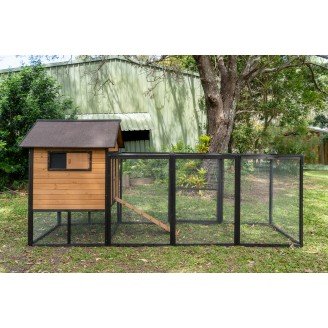Choosing the Right Chicken Coop for Your Backyard Flock
Looking for Chicken Coops Brisbane? Explore wooden chicken coops, affordable chicken coops, and more. Secure, durable, and built for Australian conditions.

Having chickens gives you great satisfaction, yet they require safe and comfortable living spaces. Chicken coops made from 100% cedar wood stay strong and protect against pests and rot. They offer extended life and safety because they lack toxic chemicals and are not treated through pressure processes. Chicken coops made from 100% cedar become the ideal residences for your birds and give them the space they need to develop well while you enjoy fresh eggs.
Essential features of a quality chicken coop
The best chicken coops in Redlands feature built-in resistance to pests and decay. Chicken waste draws microbes and parasites that can hurt you and your poultry. Effective cleaning routines stop health issues from affecting the flock. People who raise backyard chickens traditionally choose wooden chicken coops. Look for:
· Your chicken coop needs sufficient space to accommodate four to six birds based on their specific breed.
· Chickens need an enclosed shelter with secure perches to sleep.
· Comfy hens lay more eggs! Regular cleaning of living space and fresh wood chips keep chickens relaxed, encouraging them to give great eggs.
· You can remove the nesting box roof to clean and collect eggs effortlessly.
· A sliding floor with a metal cover for hassle-free cleaning.
Traditional Chicken Coops: Are they a reliable choice?
The basic version of a chicken house works exceptionally well. The coops contain both a nesting arena and a fenced playground for chickens to explore without danger. The traditional chicken coop style works well for backyard chicken keepers since it effectively serves their needs and lasts long.
Regularly check your chicken house and outside area to find and fix holes in walls and substitute broken wood pieces. Set up open spaces in the coop to vent ammonia fumes safely and block rodents from entering. A sanitary chicken dwelling space stops health issues and creates a pleasant environment for them.
Essential coop additions
Chickens must eat a nutritious diet, while ducks need clean drinking water and hygienic conditions. To maintain sanitary conditions, water must be replaced in their feeding bins.
· Nesting Boxes
Nesting boxes are essential for your laying hens inside your chicken coop. These boxes provide a quiet space for egg-laying and make it easy for you to collect eggs. To prevent chickens from sleeping in the nesting boxes, keep them dark and lower than the roosting bar. A good rule of thumb is to have one nesting box for every 4-5 chickens. Use dry bedding, such as wood shavings or chopped straws, to maintain hygiene.
· Perches and Roosting Bars
Chickens naturally prefer to roost at night, so a raised perch is essential. Choose a sturdy perch made from wood or metal, around 4 cm wide. A ladder-style configuration works best, ensuring each chicken has enough space.
· Outdoor Run for Exercise
A chook house with a secure run allows chickens to roam safely while being protected from predators, scratch the ground, and soak up the sun. The chicken coops Redlands come with tall, spacious runs with secure bolting doors for protection.
Affordable chicken coop options
Finding an affordable chicken coop doesn’t mean compromising on quality. The best coops balance durability, security, and comfort without breaking the bank. When choosing a coop, consider:
1. Size: Ensure enough space for each bird to move comfortably.
2. Material: Cedar wood is the best choice for longevity and protection.
3. Roofing: A UV-resistant asphalt roof shields chickens from extreme weather.
Understanding other poultry and pet houses
· Rabbit House
A good rabbit house should provide enough space for movement and be made from rot-resistant wood. Indoor rabbits benefit from protection from predators and weather but require rabbit-proofed spaces. Outdoor rabbits need a secure, weatherproof hutch with adequate ventilation and insulation to keep them safe and comfortable.
Rabbits hide because they’re prey animals. When they feel anxious, they instinctively look for a safe spot. It’s normal! As owners, they provide plenty of hiding spots in their space. Each hideout needs two openings so they never feel trapped. This keeps them stress-free and comfy.
· Duck House
Ducks need a wide entrance and constant access to water for two key reasons. First, they waddle together and squeeze in side by side—adorable but chaotic! Second, unlike chickens, they won't enter the coop alone at night, so a wide door makes herding them much easier.
Ducks poop a shocking amount, and it’s super watery. Wood and water? Bad combination. A wooden floor will rot fast, forcing you to replace it. Moreover, the smell? The wood absorbs it all, and it’s nasty. A duck house should be well-ventilated, insulated, and waterproof. Using deep water containers allows ducks to clean their nostrils and maintain hygiene.
Conclusion
Well-designed chicken coops in Brisbane ensure your flock stays safe, healthy, and productive. Whether you need a traditional chook house, rabbit house, or duck house, investing in a high-quality wooden coop is essential. If you’re looking for durable, affordable chicken coops in Brisbane, check out Coops and Hutches Direct for the best options.
FAQs
1. How often should I clean the chicken coop?
Clean the nesting boxes weekly and do a full coop clean at least once a month. Regular cleaning prevents bacteria buildup and keeps your flock healthy.
2. Which material works best for lining a chicken coop?
Wood shavings or hemp fiber provide insulation and absorb moisture well. To avoid bacteria growth, keep the bedding dry and fresh.
3. Do chickens need a run?
Yes! A secure run allows chickens to roam, exercise, and peck at the ground safely. Ensure the run is predator-proof for added security.
What's Your Reaction?















.jpg)
.jpg)


